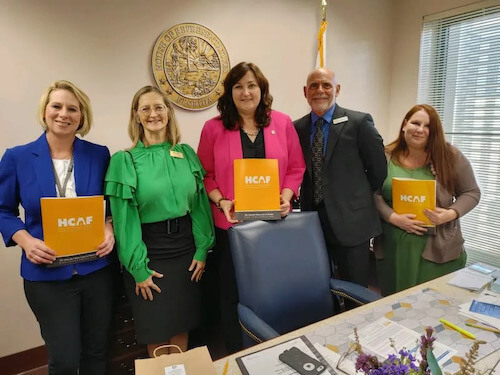Tips for Meeting With a Lawmaker
 From your local city council to your congressional representatives in Washington, D.C., advocating for home care policies is easier than you think. Remember, your legislators work for you!
From your local city council to your congressional representatives in Washington, D.C., advocating for home care policies is easier than you think. Remember, your legislators work for you!
Here’s how to make your voice heard effectively:
1. Identify Your Main Message
Before the meeting, define the key message you want to convey. Keep it direct and actionable, such as:
- “Please support policies that expand access to in-home care.”
- “I urge you to vote for [BILL NUMBER] to [PURPOSE OF THE BILL].”
2. Prepare and Practice
Research the issues, understand their impact on home care, and be ready to discuss real-world implications. If attending with a group, assign roles and run through a practice session to ensure a smooth conversation. Dress professionally when meeting with legislators.
3. Introduce Yourself with Impact
Start by stating your name, where you’re from, and that you’re a constituent (if applicable). Mention your role in the home care industry, including your agency’s name, location, and reach. If you have a personal connection to the legislator, highlight it. Always thank them for their time.
4. Be Clear, Concise, and Direct
Legislators have limited time, so keep your message focused and compelling:
- Clearly state the issue you’re addressing.
- Explain your position and what action you’re asking them to take.
- Support your case with relevant facts and key endorsements.
5. Share Personal Stories
Stories resonate. Highlight real-life examples of how home care services positively impact individuals and families in the legislator’s district or state. This makes the issue tangible and urgent.
6. It’s OK Not to Know Everything
If you’re asked a question you can’t answer, be honest. Let them know you’ll follow up with the information. This builds credibility and keeps the conversation going.
7. Stay Focused
Keep the conversation on track. If the legislator shifts the discussion to unrelated topics, briefly acknowledge their point, then redirect the conversation to your priority issue.
8. Provide a Takeaway
Leave behind a brief, well-organized document summarizing your position and key facts. This ensures the legislator has a clear reference after the meeting.
9. Follow Up for Lasting Impact
After the meeting, send a thank-you note to reinforce your key points and express appreciation. If you promised additional information, provide it promptly. Maintaining ongoing communication strengthens your advocacy efforts.
Get Involved – Your Voice Matters!
Interested in meeting with your legislator or attending an advocacy event? Contact Kyle Simon, Senior Director of Policy, Advocacy & Communications, at ksimon@homecarefla.org or (850) 222-8967.
